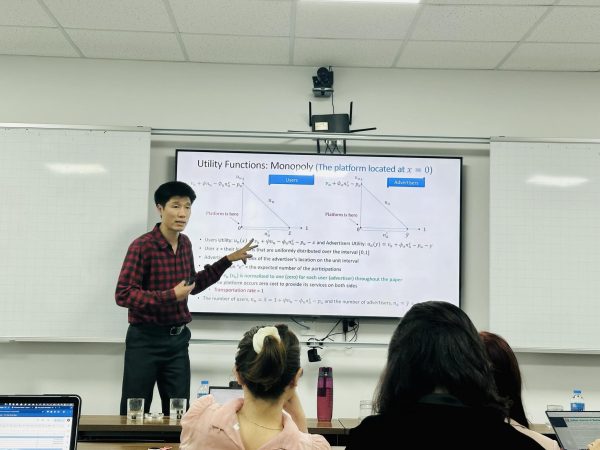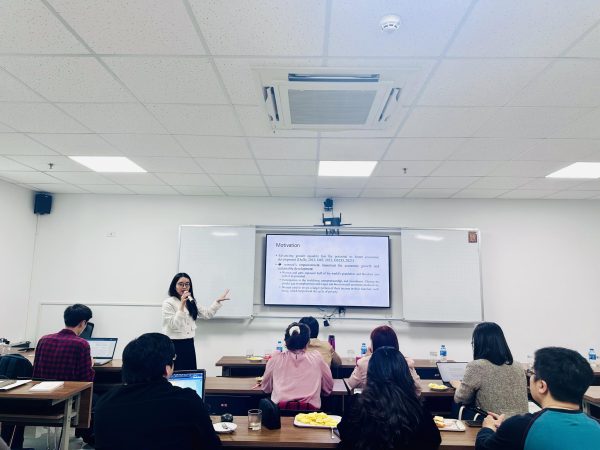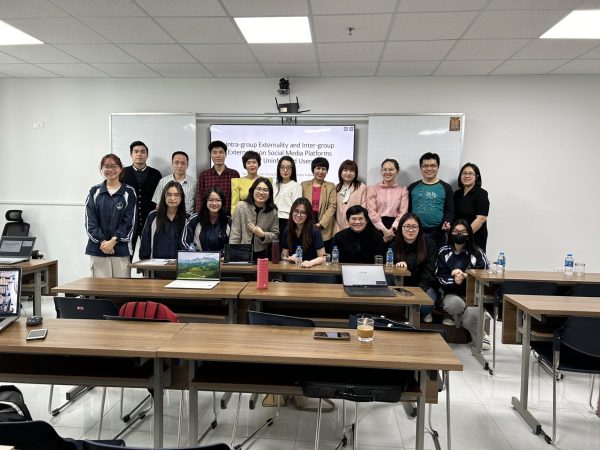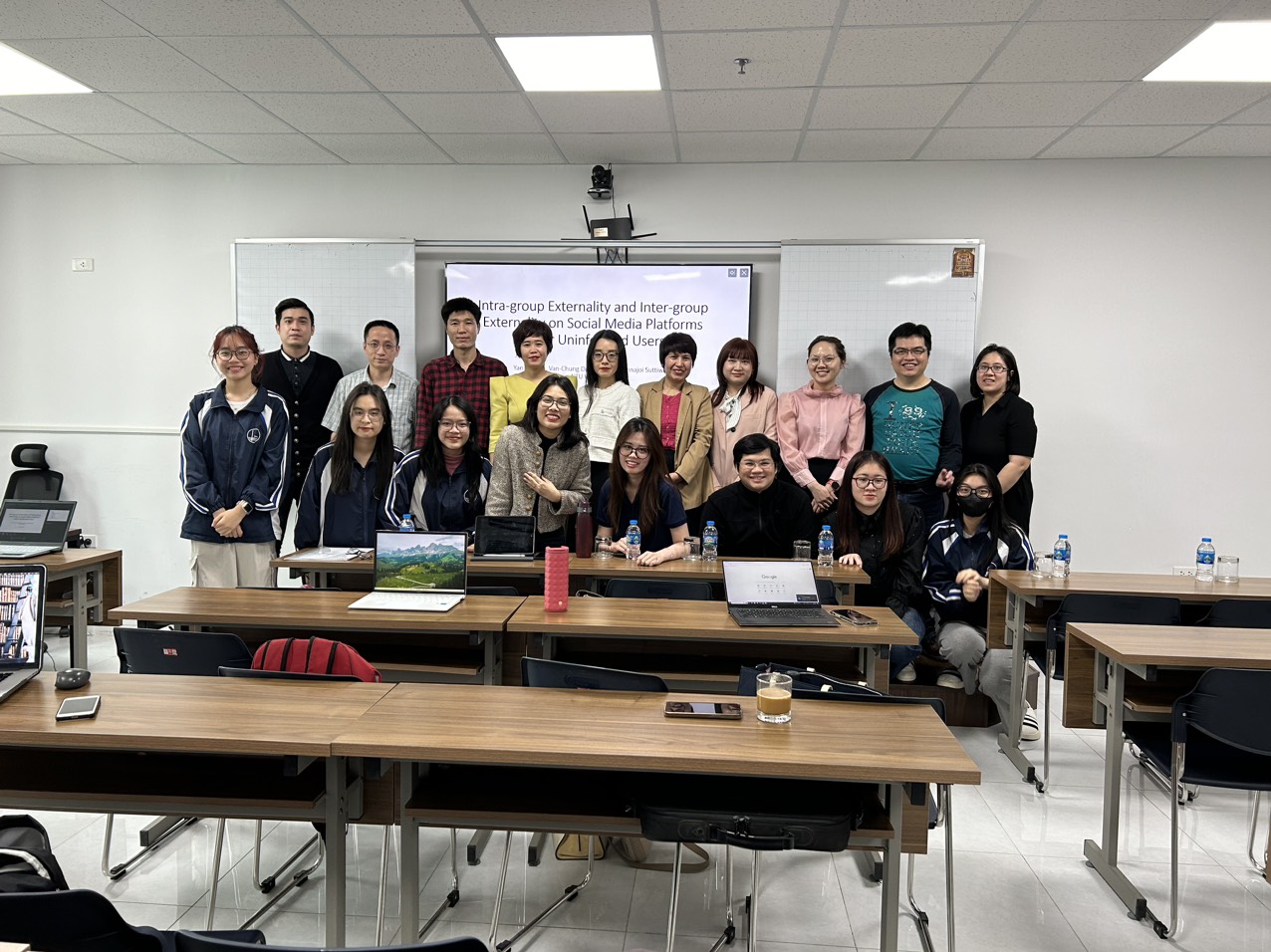The Faculty of Economics and Management, International School, Vietnam National University, Hanoi (VNU-IS) successfully organized a seminar on March 21st 2024. This is one of the seminar series conducted regularly at VNU-IS to foster a dynamic and inclusive academic environment where faculty members, students, and visiting scholars can engage in policy debates, share innovative research findings, and cultivate interdisciplinary collaborations.
Two faculty members presented their research findings. In the first session, Dr. Dong Van Chung talked about “Intra-group Externality and Inter-group Externality on Social Media Platforms under Uninformed Users”. In the second session, Dr. Nguyen Tra My discussed “The empowering effects of female education”. The seminar was chaired by Associate Professor Luu Thi Minh Ngoc and was jointly coordinated by Associate Professor Nguyen Phuong Mai. Faculty members and students enthusiastically joined the seminar, actively engaging in discussions and providing valuable input on the topics presented.

Dr. Dong Van Chung presented his findings on intra-group externality and inter-group externality on social media platforms under uninformed users.
In the first session, Dr. Dong Van Chung presented his findings on intra-group externality and inter-group externality on social media platforms under uninformed users. The speaker pointed out that positive intra-group externalities and negative inter-group externalities essentially coexist for interactions in digital spaces, such as social media platforms in two-sided markets. Suppose that on those platforms, on one side there are advertisers who are fully informed about prices and are ready to react to price changes, and on the other side there are users who do not have enough information about prices and have a passive reaction to price.
He emphasized that for monopoly platforms, platform profits are always lower in cases where users do not have enough price information. Advertiser surplus is always higher in cases where users have insufficient price information, but user surplus and social welfare are higher only in cases where users have insufficient price information if the magnitude of the intra-group externality is small enough.
Given the market structure for competing platforms, Dr. Chung’s findings indicate that platform profits are always lower and advertiser surplus is always higher in cases where users do not have sufficient price information. Especially for the dual market, user surplus and social welfare do not change. However, in competitive bottleneck markets, Dr. Chung shows that user surplus is higher in cases where users do not have enough price information, but social welfare is higher in cases where it is the case that users do not have enough information about prices only if the negative externalities between groups are small enough. In the case of wary beliefs, regardless of the market structure, the equilibrium outcome always lies between the gap between well-informed users and uninformed users with passive beliefs about price.
In the second session, Dr. Nguyen Tra My talked about the empowering effects of female education. She opened her talk by highlighting the disadvantages faced by women globally, relative to men, in various spheres such as education, employment, political representation, and domestic context. Gender inequality shaped by entrenched social norms that perpetuate such hierarchical distinctions hinders our achievement of Sustainable Development Goal 5 (SDG-5): gender equality. The speaker summarized the viewpoints expressed by scholars and international organizations about the role of advancing gender equality in fostering economic development and how education can act as a tool to empower women.

Dr. Nguyen Tra My talked about the empowering effects of female education.
In the next part of the talk, she presented her findings on the empowering effects of female education. Specifically, the speaker highlighted that education raises women’s intra-household bargaining power by raising their engagement in household decisions in both financial and nonfinancial dimensions. Furthermore, education reduces the incidence of intimate partner violence faced by women as well. Potential pathways driving the education – empowerment linkage are shown to be improvements in access to information, spouse’s education, and labor market outcome. She also discussed the intergenerational effects of female education where educated women tend to have healthier children compared to their less educated counterparts. The speaker concluded that education facilitates our path to the achievement of SDG-5 (gender equality) and SDG-3 (Good health and well-being, particularly for children).

The seminar benefited from valuable feedback and discussion from faculty members and other participants who actively participated in the seminar, asking questions, and engaging in constructive dialogue to enrich our collective understanding of economic issues and challenges.
The enthusiasm of speakers and participants alike reflects the spirit of the Faculty of Economics and Management as well as VNU-IS. Embarking on this enriching journey of intellectual exploration and collaboration, we strive to advance knowledge, inspire innovation, and make meaningful contributions to the fields of economics, finance, business and beyond. Our seminar series attempts to showcase the latest advancements in theories, empirical analysis, and policy implications, reflecting the vibrant research community within our faculty.
Nguyen Tra My
Faculty of Economics and Management
